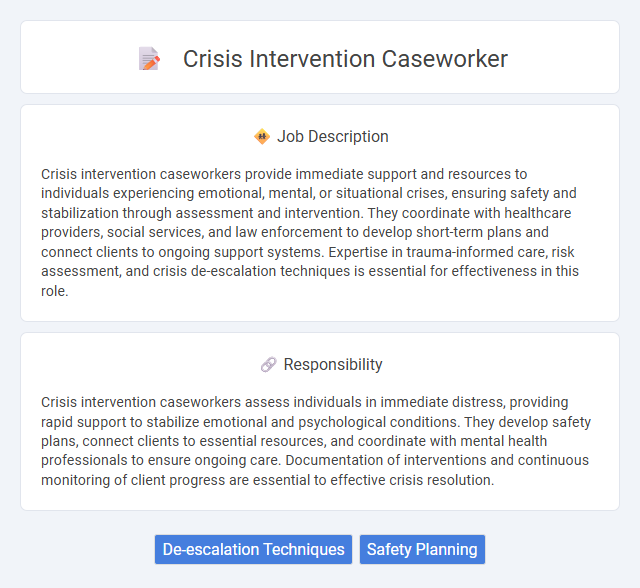
Crisis intervention caseworkers provide immediate support and resources to individuals experiencing emotional, mental, or situational crises, ensuring safety and stabilization through assessment and intervention. They coordinate with healthcare providers, social services, and law enforcement to develop short-term plans and connect clients to ongoing support systems. Expertise in trauma-informed care, risk assessment, and crisis de-escalation techniques is essential for effectiveness in this role.
Individuals experiencing high levels of emotional distress, trauma, or acute mental health crises may be suitable candidates for a crisis intervention caseworker role if they possess strong resilience and empathy. Those with the ability to remain calm under pressure and demonstrate effective problem-solving skills are likely to succeed in managing crisis situations. However, people prone to burnout or with limited emotional regulation might find this job challenging and less suitable for their well-being.
Qualification
Crisis intervention caseworkers typically require a bachelor's degree in social work, psychology, or a related field, with many positions preferring a master's degree and clinical licensure such as LCSW or LPC. Proven experience in mental health services, crisis management, and strong communication skills are essential for effectively assessing and supporting individuals in emergency situations. Certification in CPR and first aid, along with knowledge of community resources and trauma-informed care, significantly enhance a candidate's qualifications.
Responsibility
Crisis intervention caseworkers assess individuals in immediate distress, providing rapid support to stabilize emotional and psychological conditions. They develop safety plans, connect clients to essential resources, and coordinate with mental health professionals to ensure ongoing care. Documentation of interventions and continuous monitoring of client progress are essential to effective crisis resolution.
Benefit
Working as a crisis intervention caseworker likely offers significant personal fulfillment through helping individuals navigate immediate psychological and emotional challenges. The role may provide valuable experience in mental health support and crisis management, enhancing professional skills applicable in various social service settings. Opportunities for career growth and specialized training could also be probable benefits of this demanding yet rewarding position.
Challenge
A Crisis Intervention Caseworker likely faces the challenge of managing high-stress situations where swift, critical decisions are required to ensure client safety. The probability of encountering emotionally charged scenarios may demand exceptional resilience and effective communication skills. Balancing immediate crisis resolution with long-term support planning probably tests both the caseworker's adaptability and resourcefulness.
Career Advancement
Crisis intervention caseworkers develop critical skills in assessing client needs, managing emergencies, and coordinating community resources, which lay a strong foundation for career advancement in mental health and social services. Gaining certifications such as Certified Clinical Trauma Professional (CCTP) or Licensed Clinical Social Worker (LCSW) significantly enhances opportunities for supervisory or specialized roles. Pursuing advanced degrees in social work, psychology, or counseling opens pathways to leadership positions, policy development, and clinical practice.
Key Terms
De-escalation Techniques
Crisis intervention caseworkers employ advanced de-escalation techniques such as active listening, empathetic communication, and non-threatening body language to stabilize individuals experiencing acute distress. These professionals utilize cognitive-behavioral strategies to reduce emotional intensity and prevent escalation to violence or self-harm. Mastery of trauma-informed approaches ensures effective intervention while maintaining the safety of both the client and community.
Safety Planning
Crisis intervention caseworkers specialize in safety planning by developing personalized strategies to reduce risk and protect individuals facing immediate danger. They collaborate with clients to identify safe environments, emergency contacts, and coping mechanisms tailored to specific threats such as domestic violence or mental health crises. Effective safety planning integrates continuous assessment and resource coordination to ensure ongoing support and risk mitigation.
 kuljobs.com
kuljobs.com